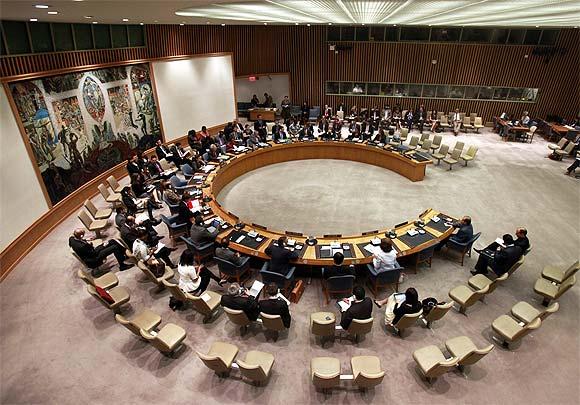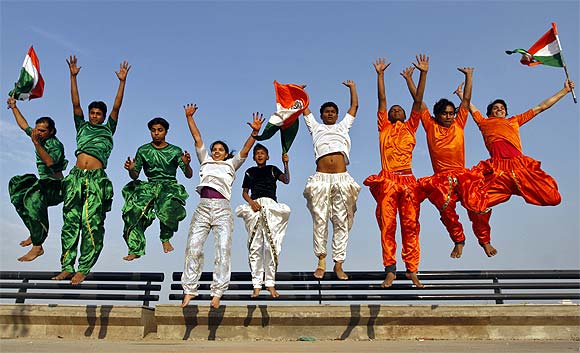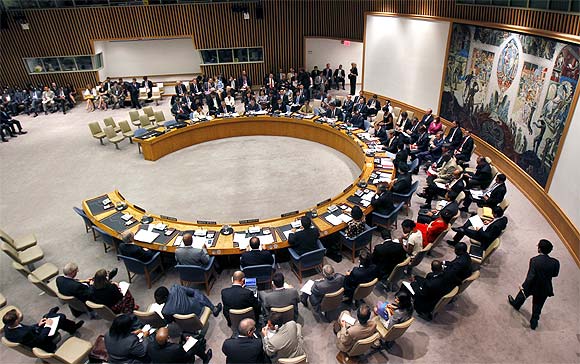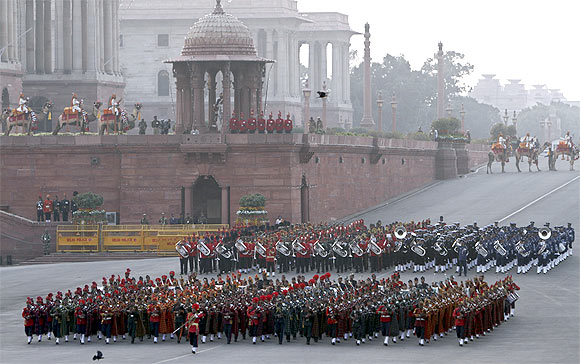 | « Back to article | Print this article |
'India doesn't DESERVE to be in the UNSC'
India can never become a great power unless it assumes hard power status, says national security hawk Bharat Karnad
Bharat Karnad, one of India's leading national security hawks, believes that India right now doesn't deserve a permanent seat on the United Nations Security Council.
Karnad, research professor in National Security Studies at the Centre for Policy Research, New Delhi, bemoaned how humiliating it is to watch "every wretched visitor who comes to Delhi," being canvassed by the government to endorse India's bid for a permanent seat in the UNSC.
"India, as is, I am afraid doesn't deserve to be in the United Nations Security Council," he said during a panel discussion on Indian Views on Economics, International Institutions and Transnational Issues at a conference organised by George Washington University's Sigur Centre for Asian Studies and the Centre for a New American Security, titled India as a Global Power, Contending Views from India.
Karnad, who is the author of several books on strategy in South Asia, including Nuclear Weapons and Indian Security: The Realist Foundations of Strategy and India's Nuclear Policy, lectures regularly at various military and other forums.
"I don't see a UN Security Council seat, especially with a veto as an entitlement. Somehow, there is a belief in Delhi, that it is a right and I believe that has to be earned," he said.
Karnad argued that the permanent five members of the UN Security Council -- the United States, Russia, China, France and Britain -- are there "because they are great powers, not because they are individual countries."
Reportage: Aziz Haniffa
Click on NEXT for more...
For Rediff Realtime News on UNSC, click here!
'We shouldn't beg for it'
Karnad said India would have to do it only through it own strength, "and not because the United States and its Western friends endorse India's seating in the UN Security Council."
"What I mean is that if India becomes a great power, then I don't see a talk about per capita and so on, because given the kind of population, we can never reach per capita scores of the kind that the United States or Western countries will -- it will never happen for another 200 years," he said.
Karnad reiterated that India can be considered and respected only "in terms of hard power, in terms of being consequential in the affairs of the world as it were, what kind of role you are going to play and it has to be a substantial role. It has to be a role that other countries can't do without. Only then will India begin to be counted as a great power deserving of a seat."
"And we shouldn't beg for it, as seems to be the case. Every wretched visitor who comes to Delhi is canvassed by the government about a UN Security Council seat. It hurts my self-respect in a personal sort of way; it hurts the national self-respect begging for a seat."
Click on NEXT for more...
For Rediff Realtime News on UNSC, click here!
'Why not India?'
Karnad was also a part of the first National Security Advisory Board of the National Security Council of the government of India as a member of the Nuclear Doctrine Drafting Group and the external security and the technology security groups for the Strategic Review.
He continued, "We will get it when we exercise hard power and begin to take responsibility for the security of the region -- for the new order in the Indian Ocean and so on and so forth."
But former Indian ambassador to the US and ex-foreign secretary Lalit Mansingh shot back, "Why not India? Why do you have France, why do you have UK? Why not India?"
"In 1945, if it reflected the power structure of the world. Today, does the present permanent membership reflect the power structure? Is it acceptable that you have one country representing three continents -- Asia, Africa and Latin America," he said.
Mansingh argued, "So there is a need for a change and if you do change, India has a right to be there."
"The response we are getting is that it is so difficult to change the charter and it's going to take a long time. If it takes a long time, India's response is to hell with the UNSC, we are not interested," he said.
Click on NEXT for more...
For Rediff Realtime News on UNSC, click here!
'There is enormous mistrust in the Indian military'
Meanwhile, when the chair Richard Fontaine on CNAS pressed Karnad on why India decided for 'technical' reasons to go with the European Medium Multi-Role Combat Aircraft instead opting for American fighter jets for 'geo-political' considerations, Karnad said, "The problem is that there is enormous mistrust in the Indian military and maybe it infects and seeps down to the government that when it comes to supplier transactions, you simply cannot trust America's contractual obligations."
He recalled that "time and time again, the United States has backed off from virtually treaty agreements, leave alone commercial contracts, like the one on Tarapur fuel. So, this seeds the kind of suspicion and certainly distrust on the Indian side. We don't trust the Americans as we do perhaps other countries."
Karnad argued, "Even if there was a geopolitical element that was defeated by the trust deficit, you couldn't be certain that tomorrow the US Congress would not write something into law that would retroactively pretty much wipe out obligatory contractual obligations and there is nothing India could do."
"We have suffered from it and so there was a salutatory message from that as to how much can India trust the United States as a supplier of critical military systems," he added.
Click on NEXT for more...
For Rediff Realtime News on UNSC, click here!




